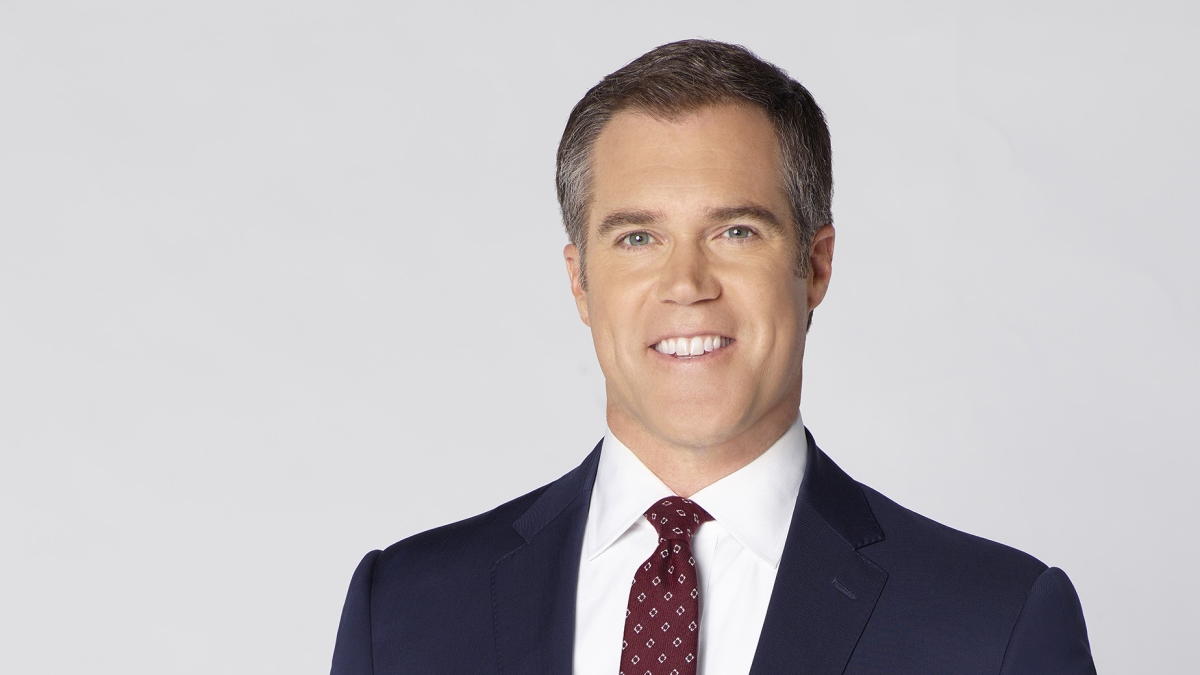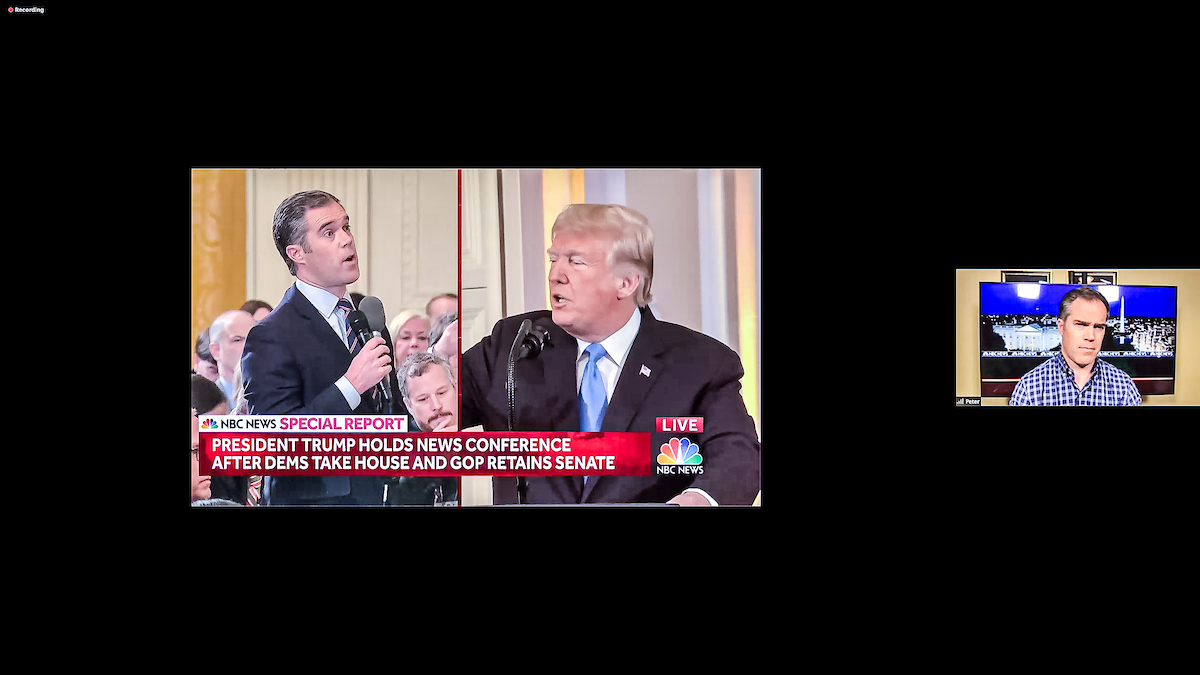Award-winning journalist and White House correspondent Peter Alexander has covered tsunamis and wars, interviewed dictators, and at times, clashed with President Donald Trump.
Holding the powerful accountable sounds like a contact sport, but Alexander said he wouldn’t trade his fast-paced, pressure-filled, all-consuming job for anything.
“There are a lot of sacrifices with this job but if you commit to doing this, I guarantee you will have life experiences whether it’s at the network or local news or in whatever community,” said Alexander, a "Weekend Today" co-anchor and NBC News White House correspondent. “Doing this job gives me a unique opportunity to make a difference. It’s a heck of a way to live.”
With two weeks left until Election Day 2020, Alexander discussed his experiences and insights in a talk titled “Political Crossroads: Reporting on the White House,” as part of the fall 2020 Must See Mondays speaker series, hosted by ASU's Walter Cronkite School of Journalism and Mass Communication.
“Peter is a shining example of one of the basic tenets of journalism – holding the powerful accountable,” said Brett Kurland, professor of practice and director of sports programs at the Cronkite School, who moderated the live Zoom event on Oct. 19. "He is quite literally on the front lines, sitting in the front row of the White House briefing room, questioning the president of the United States and various members of the administration. He is never afraid to challenge and fight for the truth. Peter is a wonderful role model for our Cronkite students.”
And Kurland ought to know. The two men have a shared history that dates back to the mid-1990s when they were classmates at the Medill School of Journalism at Northwestern University.
“Peter is one of my oldest friends in journalism. We met during the first week of our freshman year of college. We lived in the same dorm for two years and went through many of the same journalism classes together,” Kurland said. “We were hallmates in our sophomore year. Peter actually introduced me to my wife, so I am forever grateful.”
He was also grateful for the informative and wide-ranging discussion Monday night, which painted a picture of a White House correspondent’s job.
Cronkite Professor of Practice Brett Kurland played this clip of Peter Alexander, a White House correspondent for NBC News, having an exchange with President Donald Trump earlier this year. Kurland moderated the Zoom conversation and Q & A for the Cronkite School’s Must See Mondays speaker series on Oct. 19.
Alexander's fascination with journalism took hold in his youth while growing up in San Francisco.
“We would watch the "CBS Evening News" with Dan Rather and see these reporters signing off from Moscow and from Beijing and from Boston,” Alexander said. “That just intrigued me and it felt like such a cool, unique way to live your life.”
After college graduation, Alexander landed jobs in Lexington, Kentucky, and Spokane and Seattle, Washington, as a lead reporter and substitute evening anchor and covered the 2000 presidential campaign.
In 2004, he was hired by NBC News and covered numerous international stories, including Iraq’s historic 2005 election, the death of Osama bin Laden and the tsunami in Indonesia. He also interviewed then-Cuban President Fidel Castro during Hurricane Ivan in 2004. Alexander also covered national breaking news events, including anchoring live coverage of the “Miracle on the Hudson” and the tragedy at Virginia Tech. He got his sea legs with sports reporting covering the 2008 Beijing Olympic Games, the 2010 Vancouver Olympic Games and the 2016 Rio Olympic Games.
Those experiences led to an appointment to cover the White House for NBC News during President Barack Obama’s second term. He said walking into the White House for the first time as a reporter was a near-hallowed experience.
“I remember going through there and angelic music was played,” Alexander recalled. “My heart was beating out of my chest as I walked in. I couldn’t believe it. The idea that I would be reporting and the most powerful person on the planet is going to be standing somewhere in the middle of that building behind you as you were speaking and conceivably watching.”
Alexander spent a majority of his time with Kurland talking about the last four years, when a change in administration also brought about a distinct change in mood among the White House press corps. He constantly hears President Donald Trump call him and his colleagues “fake news media” and “an enemy of the people.” He also watched Trump dress down CNN’s Jim Acosta as a “rude and terrible person.” When Alexander stepped up to defend Acosta, Trump had words for him as well.
“I’m not a big fan of yours either, to be honest,” Trump said. In another instance, Trump called Alexander a “terrible reporter” in front of his colleagues when he asked a COVID-19-related question.
Alexander said he takes such comments in stride.
“To be totally sincere, I’m kind of used to it now, which is probably not a good place,” he said. “When the president says ‘fake news’ or ‘enemy of the people,’ it doesn’t even get a headline like it did early on but that doesn’t make it any better. Somehow I dare say ‘normalized,’ but we’ve become so used to it.’”
Alexander works hard to manage the challenges that come with the 24/7 news cycle, the first Twitter presidency, the era of “alternative facts” and the number of major breaking news stories in the past year. That includes the Russian collusion investigation, Trump’s impeachment in the House of Representatives, the COVID-19 pandemic, the death of George Floyd, the 2020 presidential race, President Trump testing positive for COVID-19, the death of Supreme Court Justice Ruth Bader Ginsberg and the confirmation hearings for Amy Coney Barrett.
“There’s a lot going on,” Alexander said. “News is breaking at a pace you cannot fathom. Our news cycle can turn on a dime. … There’s a lot to juggle. It’s a ton of different topics and you can’t be an expert on all of them, but you sure better know about plenty or most of them.”
Alexander said the best antidote to the demands of the job is to stay focused, rely on instincts and report the facts.
“I view myself now really more than ever as an advocate for the facts,” Alexander said. “The best thing you can do is know the facts and know the context. … It’s about the people we cover and we’re going to do our damn best every day to get the best information to Americans.”
Top photo courtesy of NBC News
More Law, journalism and politics

Exhibit uses rare memorabilia to illustrate evolution of US presidential campaigns
After one of the most contentious elections in history, a new museum exhibit offers a historical perspective on the centuries-old American process.“We The People! Electing the American President” had…

TechTainment conference explores the crossroads of law, technology, entertainment
What protections do writers, actors, producers and others have from AI? Will changing laws around name, image and likeness (NIL) eliminate less lucrative college sports programs?And what does…

How to watch an election
Every election night, adrenaline pumps through newsrooms across the country as journalists take the pulse of democracy. We gathered three veteran reporters — each of them faculty at the Walter…

